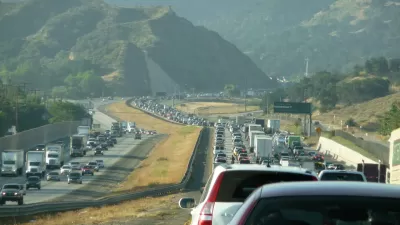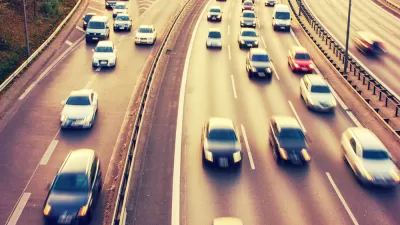So much for the 2015 record of 3.148 trillion miles. Last year saw a cumulative travel increase of 2.8 percent to 3.218 trillion miles, setting a new record as cheap gas contributed to increased driving.

The 2016 driving mileage estimates were released Tuesday by the Federal Highway Administration (FHWA). They mark the "fifth straight year of increased mileage on public roads throughout the nation."
"The driving increase slowed compared to 2015, which saw a 3.5 percent uptick in driving from 2014," writes E&E News reporter Camille von Kaene.
Last year at this time, FHWA reported on 2015 mileage totals, which were truly record-setting in the sense that they were higher than the previous "peak-driving" year, 2007.
In her report last year on the 2015 mileage increase (which also appeared in Scientific American), von Kaene wrote that the increase was the highest in more than a decade.
As for per capita driving, those "totals had been falling since a peak in 2004, but that started to reverse in 2014," added von Kaenel.
"This makes our work on efficiency and alternative fuels all the more pressing," said Dave Cooke, a senior vehicles analyst with the Union of Concerned Scientists [Clean Vehicles Program]. He called reducing driving itself, through policies like sustainable city planning, "a very long-term game plan."
So, if "peak car" is truly shattered, what does that say about years 2007 to 2012 which saw declining driving? [The five years of increase were 2012 through 2016, with the last two record-breaking.]
Adie Tomer, a fellow at the Brookings Institution's Metropolitan Policy Program, suggested that may mean the slowing in driving in the past decade was a "blip."
"Maybe that progress wasn't as good as it seemed," he said. "Many Americans are effectively tethered to their cars."
An August 2014 post listed five reasons why 'peak car' was here to say. All exist today save one: "Higher gas prices discourage driving." Ironically, it was July 2014 when gas prices began falling, then plummeted that November after an OPEC decision brought about the current era of cheap gas that doomed, for now, the concept of peak driving.
Driving and Energy Forecasts
In her current article on 2016 vehicle mileage data, von Kaenel includes includes forecasts that show increased driving is here to stay for decades. For gasoline and oil demand, the news is mixed.
The federal Energy Information Administration expects U.S. vehicle miles traveled to continue to increase through midcentury. The agency expects gasoline demand from light-duty vehicles to peak in 2018, although that depends on driving behavior, fuel efficiency improvements and sales of electric vehicles. It expects oil demand to rise into the 2040s.
See FHWA's "Traffic Volume Trends" reports for more precise vehicle miles traveled data. The December report includes cumulative totals for 2016.
FULL STORY: Americans shatter another driving record [May require subscription]

Trump Administration Could Effectively End Housing Voucher Program
Federal officials are eyeing major cuts to the Section 8 program that helps millions of low-income households pay rent.

Planetizen Federal Action Tracker
A weekly monitor of how Trump’s orders and actions are impacting planners and planning in America.

Ken Jennings Launches Transit Web Series
The Jeopardy champ wants you to ride public transit.

Washington Legislature Passes Rent Increase Cap
A bill that caps rent increases at 7 percent plus inflation is headed to the governor’s desk.

From Planning to Action: How LA County Is Rethinking Climate Resilience
Chief Sustainability Officer Rita Kampalath outlines the County’s shift from planning to implementation in its climate resilience efforts, emphasizing cross-departmental coordination, updated recovery strategies, and the need for flexible funding.

New Mexico Aging Department Commits to Helping Seniors Age ‘In Place’ and ‘Autonomously’ in New Draft Plan
As New Mexico’s population of seniors continues to grow, the state’s aging department is proposing expanded initiatives to help seniors maintain their autonomy while also supporting family caregivers.
Urban Design for Planners 1: Software Tools
This six-course series explores essential urban design concepts using open source software and equips planners with the tools they need to participate fully in the urban design process.
Planning for Universal Design
Learn the tools for implementing Universal Design in planning regulations.
Heyer Gruel & Associates PA
Ada County Highway District
Institute for Housing and Urban Development Studies (IHS)
City of Grandview
Harvard GSD Executive Education
Toledo-Lucas County Plan Commissions
Salt Lake City
NYU Wagner Graduate School of Public Service




























